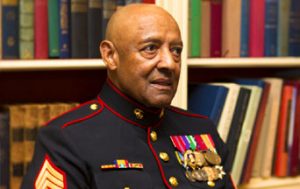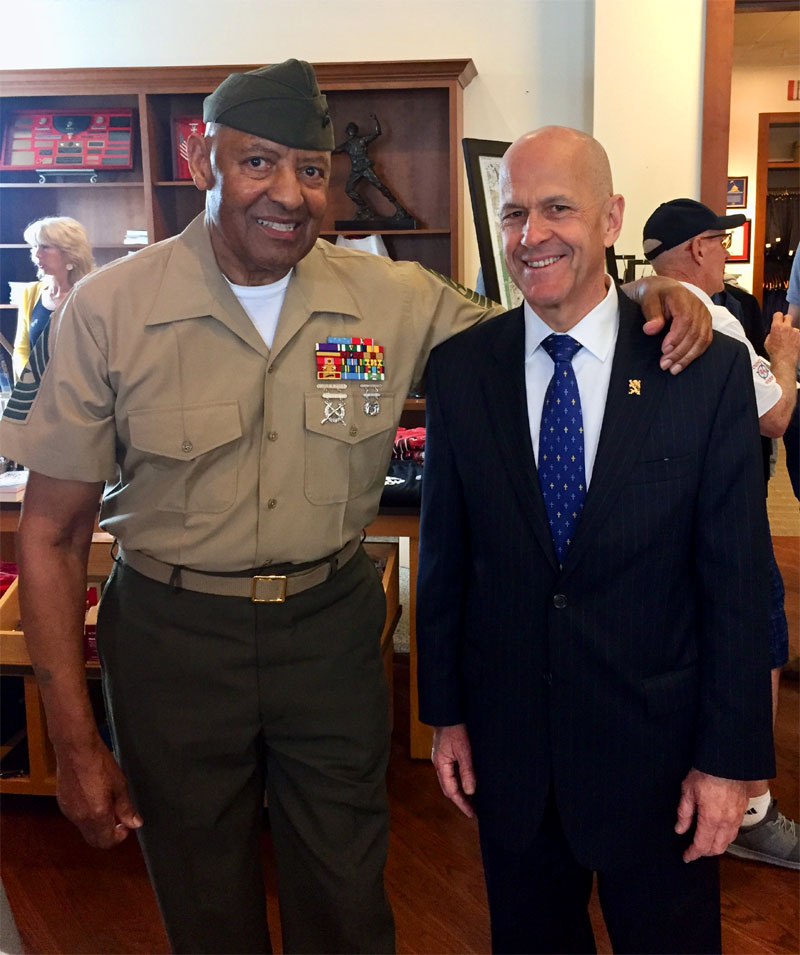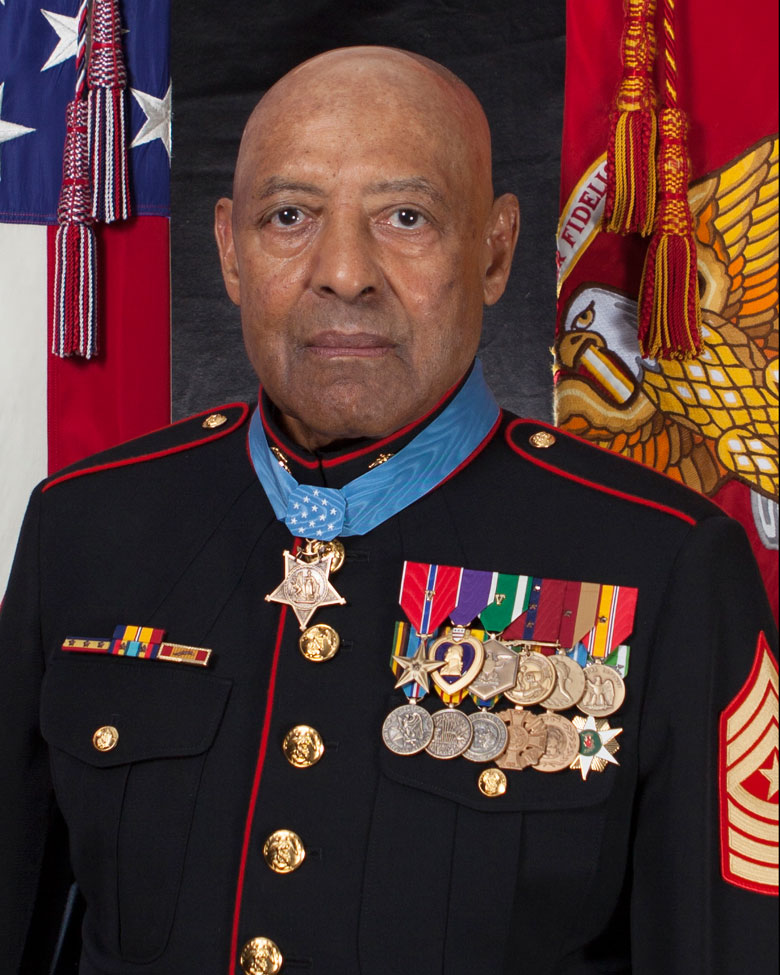
John Canley knew he wanted to be a Marine when he was only thirteen years old. He and his older brother L.J. went to see the movie Sands of Iwo Jima starring John Wayne. He left the theater transformed. What moved him most was the scene of the marines raising the American flag on Mount Suribachi.
A year and a half later, John, (with initials J.L.) asked his older brother L.J. if he could borrow his birth certificate. His brother readily gave it to him and probably knew his intentions.
With the maturity of someone much older, young John marched into the recruiter’s office to enlist. When the Leatherneck behind the desk looked at his birth certificate, he quipped, “They got the initials wrong.” With all the confidence he could muster, John smiled, shrugged his shoulders and acknowledged the error. The Marine handed him back the certificate with a hearty “Welcome to the Corps!”
John Canley would serve almost three decades in the Marines, including multiple tours of duty in Vietnam between 1964 and 1970. During the Tet Offensive, he earned the Navy Cross which was upgraded to the Medal of Honor in October of last year.
All recipients of the Medal of Honor go “above and beyond” the line of duty. However, those like John Canley take heroism and sacrifice to unimaginable realms.
Help Remove Jesus Toilet Lid on Amazon
Knowing this man’s story is important because Americans were spoon-fed a disgraceful account of those who fought in that unpopular war. Thus, entire generations were robbed of outstanding heroes. This is a glimpse of one such hero.
A Living Hell on the “Hill of Angels”
We can only appreciate the heroics which earned John Canley the Medal of Honor by taking a quick look at what he did in Con Thien, Vietnam.
Loosely translated as “a small mountain with heavenly beings,” Con Thien is also more commonly known as the “hill of angels.” Either way, it was anything but heavenly on November 26, 1967, when then-Gunnery Sergeant John Canley arrived with Alpha Company, 1st Battalion, 1st Marines.
Satanic Christ Porn-blasphemy at Walmart — Sign Petition

Their first patrol outside the base camp was eerily quiet. The man who was eventually known as “The Gunny” was suspicious. He felt certain that the enemy was lulling the marines into a false sense of security. The second patrol was not much different, but all hell broke loose on the third trip outside the wire.
North Vietnamese Army (NVA) regulars filled the air with rockets, mortars and rocket-propelled grenades (RPGs). The Marines desperately sought refuge in tank track furrows to get below the withering fusillade. One Marine did not get down in time and took a round in his leg, which came spinning off. Enemy soldiers tried to capture the wounded Marine, but Gunny Canley would have none of it. He put his M-16 on full auto and sprayed in the direction of the NVA. The Marine then crawled to safety.
As the battle intensified, Marines found themselves in a pitched battle against a machine-gun-wielding adversary that was a mere fifteen yards away. This did not matter to The Gunny. Known for his calm in the heat of battle, he dangerously exposed himself to enemy fire to gather wounded and dead Marines.
How Panera’s Socialist Bread Ruined Company
Sgt. Maj. Eddie Neas, from Brooklyn, New York, was an eyewitness to such heroics a month later when Alpha company was sent to help Bravo Company which had been hit hard by an NVA unit. Neas quit high school as a 17-year-old and joined the Marines because, he said, “I wanted to have someone shoot at me, and I wanted to shoot back at them.” He was now getting his wish.
As an 18-year-old then Lance Corporal Neas, he vividly remembered this particular battle. PFC Richard L. Norton was killed instantly after being hit by a B40 rocket. Lance Corporal Macmillan was shot in the chest as they were getting ready to assault the NVA stronghold. When the corpsman arrived on the scene, he too was hit.
Sgt. Maj. Neas tells how The Gunny calmly walked over, amidst heavy enemy fire and picked up the wounded corpsman. On his return, he looks down at the young Marine from Brooklyn and says, “Keep your head down, we’ve got heavy incoming.” After taking the wounded Marine to safety, he retraces his steps to pick up the other Marine with the same placid disposition, as one strolling in the park.
Ken Jordan, author of Marines Under Fire, depicts Canley moving, “to and from the scene of battle at least five times” to assist in the evacuation of casualties. Sgt. Maj. Neas watched intently as the fearless Marine crossed over 25 yards of open terrain, through incoming mortars and continuous small arms fire. He then calmly carried two dead Marines off the battlefield, one on his shoulder and the other under his arm. While marines are known for not leaving any man behind, this brand of fidelity reminds one of the Good Shepherd who “lays down his life for his sheep.”
After his extraordinary gallantry at Con Thien, Sgt. Maj. Canley later fought in the most intense battle of the Vietnam War.
Battle for Hue City
The Tet Offensive, named after the Vietnamese New Year, was strategically launched on the night of January 31, 1968, when the country was celebrating. Vietcong guerillas, 80,000 strong, took advantage of the festive atmosphere to infiltrate one hundred cities throughout South Vietnam and mix in with the civilian population. Over 10,000 guerillas occupied Hue City, the old imperial capital. Alpha Company, under the lone commissioned officer, Capt. Gordon Batcheller, was assigned to be the initial reaction force.
American forces and their South Vietnamese counterparts were outnumbered ten to one. As they entered the city, they were ambushed. Capt. Batcheller took a round in the leg as he helped a wounded Marine. He would earn a Navy Cross for his never-quit actions but nevertheless had to be evacuated. John Canley, a gunnery-sergeant, was catapulted into the position of commander of the entire company.
As they entered the walled city of Hue, Pat Fraleigh from Poughkeepsie, New York was aboard the lead tank crossing the Perfume River Bridge. They were suddenly hit by two RPGs. The second one threw Fraleigh head over heels onto the highway. He was bleeding from multiple wounds and barely clinging to life. As he lay helpless under fire, he watched with horror as an American tank came rumbling down the road in his direction. In the fog of war, they did not see him.
Fraleigh prayed and most likely thought of his fiancé Marcia. They had known each other since seventh grade. He refused to marry her before leaving for Vietnam out of fear that he would be killed and leave her a widow.
This might have happened if not for Canley. He grabbed Fraleigh by the seat of the pants just in time and dragged him out of harm’s way. The stunned Marine looked up and was amazed at the calm gaze of The Gunny who then carried him to a nearby house, absolutely unconcerned with the hot lead that filled the air.
While patching the wounds of his fellow Marine, an RPG struck the house where they had taken refuge. Gunny Canley instinctively covered Fraleigh and winced as hot shrapnel pierced his body. He patched Fraleigh’s wounds as blood ran down his own face from the shrapnel hits just above his eyelids.
Before losing consciousness, Pat Fraleigh remembers Gunny Canley winking at him, saying, “Goodbye Marine.” The Gunny thought Fraleigh was dead but later found out he had miraculously survived.
During yet another fierce firefight at a hospital compound days later, Sgt. Maj. Canley exposed himself to danger once again. His Medal of Honor citation relates how the Marine, “twice scaled a wall in full view of the enemy to carry wounded Marines to safety.”
The Tet Offensive raged for another month, but in the end, anti-communist forces emerged victoriously.
The Gunny was later promoted to Sergeant Major. He did not retire from the Marines until 1981 after twenty-eight years of service.
“To Really Live, You Must Nearly Die”
Marcia Fraleigh described the first time she met Sgt. Canley in a telephone interview with the author. It was an emotional moment as she approached the giant, six-foot-two Marine with the gentle brown eyes.
“I began to say thank you,” she said, “then burst into tears.” He also wept and then walked away as if not wanting to relive a day, which could have turned out much differently. This reaction is understandable, considering her profound gratitude to the man who saved the life of her future husband. However, the impact of this remarkable man extends beyond grateful wives.
Gen. Ray Smith, who earned a Silver Star during the Battle for Hue and the Navy Cross during the 1972 Easter Offensive, described Sgt. Maj. Canley as someone “totally, completely and absolutely without fear.” Choked by tears, he added, “All of us literally worship the ground he walks on. He is a very, very special human being.”

The author had the great honor to meet this great man at a signing for the book, The Gunny, written by John Ligato, who tells the Marine’s story. When you look into his eyes and your hand is lost in his powerful grip, you will notice something hard to explain. He looks down at you with a protective expression. He may be an octogenarian, but you know by his muscular frame and calm determination that you have nothing to fear. The impression you come away with is that he is someone who would lay down his life for you.
This protective instinct was captured well when The Gunny author, Mr. Ligato, describes Sgt. Canley “strolling” around saving his men. He was like the “mother duck,” which makes sure none of his ducklings wander off and get hurt.
His calmness under fire calls to mind a quote from Winston Churchill. The former Prime Minister, known for his love of being in the heat of battle, is often quoted as saying, “Nothing in life is so exhilarating as to be shot at without result.”
[like url=https://www.facebook.com/ReturnToOrder.org]
However, what really describes The Gunny is a saying that was inscribed on the zippo lighter of a Marine who served under Canley during the Tet Offensive.
“To really live,” it said, “you must nearly die.” Perhaps that is what explains the extraordinary life of Sgt. John Canley. He faced death on numerous occasions to destroy the enemy and save the lives of fellow Marines. When you look him in the eye, you sense he is someone who is very alive because on many occasions he nearly died.


